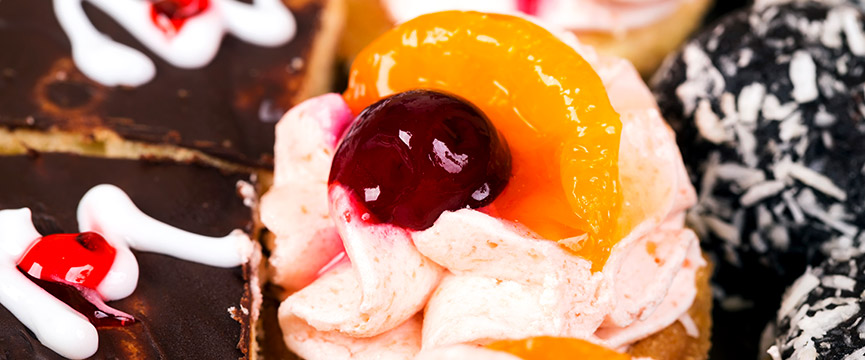 Is it possible to make delicious 100% vegan desserts (with vegan preserved fruit) for your industrial pastry? The answer is Yes. You must just learn that milk and eggs can be substituted, and what vegan preserved fruit serve you for this purpose. Let’s see…
Is it possible to make delicious 100% vegan desserts (with vegan preserved fruit) for your industrial pastry? The answer is Yes. You must just learn that milk and eggs can be substituted, and what vegan preserved fruit serve you for this purpose. Let’s see…

Table of Contents
What’s the difference between vegan and vegetarian?
The main difference between vegetarians and vegans is that the first ones do not eat meat of any kind, but the vegans also dispense with eggs, milk and honey, which are products of animal origin.
Therefore, and for the purpose that arises here, the issue is to make delicious sweet desserts without these foods or their derivatives.
Substitutes for milk
The function of the milk in the confectionery is to moisturize and dissolve the sugar and salt, to provide softness and to improve the flavour, activating the yeasts. On the other hand, the butter, a milk derivative, gives flavour, softens the dough and provides consistency.
How can they be substituted in vegan pastries? With coconut milk, rice or oat milk and soy milk. But it should be taken into account, for example, that coconut milk is the only vegetable milk you can make heavy whipped cream with.
As far as butter is concerned, it can be replaced by a margarine which does not contain dairy products or just by vegetable oil.
Substitutes for eggs
The function of eggs in pastry recipes is to agglutinate and emulsify, allowing the binding of the rest of ingredients. The egg yolks retain moisture, and provide flavour and a a soft texture, while the whites increase volume.
How to replace eggs in vegan desserts? If the recipe has only one or two eggs, they can be replaced by a tablespoon of water, while for recipes such as puddings, custards, flans or creams, just mix corn flour and water (1 tablespoon of cornstarch for 3 tablespoons of water at room temperature).
Pastries full of flavour and colour with preserved fruits
In addition, to make vegan desserts you can take advantage of traditional products such as candied fruits, jelly fruits, fruit jam and fruits in syrup. You can give flavour and colour to the desserts with them. But then another issue arises…
Is preserved fruit suitable for vegans…?
 Preserved fruit matches perfectly with vegan requirements on food, except for a small factor that few take into consideration: among the natural dyes there is one of animal origin, extracted from an insect: cochineal.
Preserved fruit matches perfectly with vegan requirements on food, except for a small factor that few take into consideration: among the natural dyes there is one of animal origin, extracted from an insect: cochineal.
Additives of animal origin are usually labelled with the letter E. In the case of cochineal, this is the E-120. We speak of a natural colorant, but of animal origin, since it is obtained from the dried fertilized females of a small insect that lives in the cacti: the red cochineal.
Is there always red cochineal in red preserved fruit?
Colours may be artificial or natural. A vegan person would not have any incompatibility with artificial dyes. There would only be a problem if preserved fruit with natural dyes carried the E-120 for the red pigment.
As we explained in a post about pros and cons of natural colour glace cherries, most of the natural dyes used in the food industry to provide red pigment come from fruits and vegetables. However, the red cochineal is still widely used. It is a completely safe and natural dye, hence its widespread use, although several studies already predict that its consumption will be reduced due to the scarcity of production areas and because of its vulnerability to climatology.
Vegan preserved fruit
At Lazaya we are aware of the depth of vegan philosophy in the lives of many people, and among our customers around the world, we have many who perform kosher or halal elaborations, so they can’t use the E-120 dye either. That is why we make vegan preserved fruit for our customers, without the E-120 colouring when we are asked for. This way, if you make special pastries you can rely on our vegan preserved fruit, which we make for special requirements.
Shall we talk about it?





